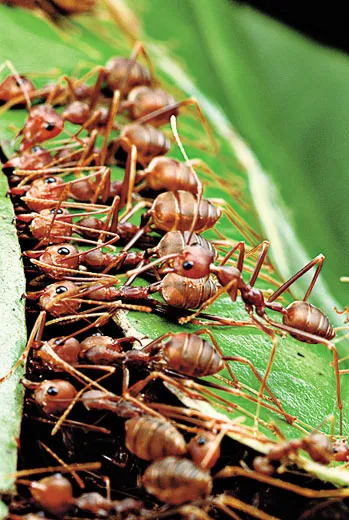Reviews of Thread the Smithsonian Looks at Evolution
Edward O. Wilson of Harvard University knows the terrifying power of the nest firsthand—and first-ankle, crook of the knee, any patch of skin that happened to be unsheathed as the eminent evolutionary biologist has crept through tropical rainforests studying some of the most aggressive emmet species in the earth. Ants are a wildly successful sector of nature's bestiary, bookkeeping for maybe a quarter of all terrestrial animal matter—the same percentage of biomass that we humans can claim. They're found on every continent save Antarctica and in simply about every possible setting, and though you may dislike ants at a picnic, yous'd dislike even more a park that was scrubbed antiseptically pismire-gratis.
As Wilson has learned through painful feel, ants will defend their nest vigorously, violently, to the death if need be; and the more elaborate the dwelling house, the more than ferocious the homeland security system. In the forest canopies of equatorial Africa and Asia, weaver ants construct spectacular swaglike nests of leaves stitched together with silken threads extracted from the colony's larval ranks. Should whatsoever creature venture within smelling distance of the nests, weaver pismire soldiers will eddy out to bite and spray bullets of formic acid. In the Solomon Islands during World State of war 2, Wilson writes, "marine snipers climbing into trees were said to fear weaver ants as much every bit they did the Japanese."
In his newly published The Social Conquest of the Earth—the 27th book from this ii-fourth dimension winner of the Pulitzer Prize—Wilson argues the nest is central to agreement the ecological dominance not only of ants, but of human beings, too. Ants rule the microhabitats they occupy, consigning other insects and small animals to life at the margins; humans own the macroworld, Wilson says, which nosotros take transformed and then radically and rapidly that nosotros now authorize every bit a kind of geological force. How did we and the ants proceeds our superpowers? By being super-cooperators, groupies of the group, willing to ready bated our small, selfish desires and I-minded drive to join forces and seize opportunity as a self-sacrificing, hive-minded tribe. In that location are plenty of social animals in the globe, animals that benefit by living in groups of greater or lesser cohesiveness. Very few species, still, take made the spring from simply social to eusocial, "european union-" meaning true. To qualify equally eusocial, in Wilson's definition, animals must live in multigenerational communities, practice partitioning of labor and behave altruistically, ready to cede "at least some of their personal interests to that of the group." Information technology'south tough to exist a eusocialist. Wouldn't you rather just take hold of, gulp and go? Yet the payoffs of sustained cooperation can exist huge. Eusociality, Wilson writes, "was one of the major innovations in the history of life," comparable to the conquest of land by aquatic animals, or the invention of wings or flowers. Eusociality, he argues, "created superorganisms, the next level of biological complication higher up that of organisms." The spur to that exalted land, he says, was always a patch of prized real estate, a focal indicate luring group members back each day and pulling them closer together until finally they called information technology habitation. "All brute species that take accomplished eusociality, without exception, at offset built nests that they defended from enemies," Wilson writes. An anthill. A beehive. A crackling campfire around which the cavern kids could play, the cave elders stay and the buffalo strips blacken all day. Trespassers, of course, would be stoned on sight.
Every bit Wilson sees it, human beings are eusocial apes, and in our brand of farthermost togetherness we stand up apart—from other living monkeys and apes, and from the many hominids that either preceded or coexisted with us and are now extinct, including Man neanderthalensis, who patently weren't much for amalgam elaborate campsites or other nest equivalents. Confronting the impetus of a Human being sapiens united front, forged at the campfire and undoubtedly amplified through the frequent singing of "100 bottles of mead on the wall," the Neanderthals may well have been as helpless every bit grasshoppers in the path of army ants.
Yet our eusocial nature, Wilson emphasizes, is nothing like that of the robotic ants. It developed forth an entirely different route and is jump up with other aspects of our humanity—our anatomy, our intellect and emotions, our sense of gratis will. He takes usa on an elegant spin through our prehistory, highlighting the stepwise rules of engagement for achieving total global dominance. Rule No. 1: Be a terrestrial animal. "Progress in applied science beyond knapped stones and wooden shafts requires burn down," Wilson says. "No porpoise or octopus, no matter how bright, can ever invent a billows and forge." Dominion No. 2: Exist a large terrestrial animate being. The vast bulk of country creatures weigh barely a pound or 2, but if you're going to take a big encephalon, yous need a large body to support information technology. No. 3: Get the easily right. Forget standard-outcome paws, hooves or claws. To hold and manipulate objects, you demand "grasping hands tipped with soft spatulate fingers." With our flexible digits and opposable thumbs, nosotros became consummate kinesthetes, sizing up the earth manually and enriching our listen. "The integrative powers of the encephalon for the sensations that come up from treatment objects," Wilson says, "spill out into all other domains of intelligence." That goes for social intelligence in spatulate spades. With easily nosotros tin wave hi, seal a deal, keep in touch or join in a circumvolve, unite the many as one.
Our hypersocial spirit is both a great blessing and a terrible expletive. Experiments accept shown that it is shockingly easy to elicit a sense of solidarity among a group of strangers. But tell them they'll exist working together as a team, and they immediately start working together equally a squad, all the while attributing to each other a host of positive qualities like trustworthiness and competence—an instant 5-star customer review.
Yet we are equally prepared to practise boxing against those who fall outside the congenial frame. In experiments where psychologists divided people into groups of arbitrarily assigned traits—labeling i set the Bluish team and another the Dark-green, for instance—the groups started sniping at each other and expressing strong prejudices toward their "opponents," with the Greens insisting the Blues were untrustworthy and unfair. The "bulldoze to form and take deep pleasure from in-group membership easily translates at a higher level into tribalism," Wilson says, and can spark religious, indigenous and political conflicts of breathtaking brutality.
Wilson as well traces what he considers the tragedy of the human being condition to the private struggle of usa versus me. He sees united states as a kind of mixed economy, the complicated fruit of a sharply disputed process known equally multilevel choice. By this reckoning, some of our impulses are the outcome of private selection, the competition of you against everybody else for a share of life's goodies. Other traits are under the sway of group option, prompting us to behave altruistically for the sake of the team. Information technology appears our individually selected traits are older and more than central, harder to constrain, the ones we traditionally label vices: greed, sloth and lust, the way we covet our neighbor's life and newspaper over our failings with pride. Our eusocial inclinations are evolutionarily newer and more frail and must be vociferously promoted by the group if the group is to survive. They are the stuff of religions and Ben Franklin homilies and correspond the virtues we admire: to exist generous, kind and levelheaded, to control our impulses, continue our promises and rise to the occasion even when nosotros are scared or disheartened. "The human condition is an owned turmoil rooted in the evolution processes that created the states," he writes. "The worst in our nature coexists with the all-time, and then it will ever be."
Not all biologists agree with Wilson's ideas near the source of humanity'south dominance or existential angst. Some resist calling humans eusocial, preferring to restrict that term to animals like ants, in which but ane or a few group members reproduce and the residue nourish to the royal ones' brood. Other biologists dislike invoking group selection, saying simpler, time-tested models based on individual genealogies will exercise. Still others take adopted a remarkably sunny view of humanity and its prospects. The social scientist Steven Pinker, also of Harvard, argues in his recent book The Ameliorate Angels of Our Nature that war and trigger-happy conflict accept been declining steadily and may soon be obsolete. Similar Wilson, Pinker believes that evolutionary forces have shaped human nature into a complex amalgam of the bestial and heroic, the compassionate and pitiless (although in Pinker's view, those forces practise not include group selection). Yet Pinker argues that, even while we retain our base and bloody impulses, historical trends such as stronger governments, increased prosperity, literacy, education, trade and the empowerment of women have allowed us to effectively tame them.
For his part, Wilson cultivates a beautifully appointed gloom. "We have created a Star Wars civilization, with Stone Age emotions," he says. "We thrash almost" and are "a danger to ourselves and the balance of life." Our conquest of earth has happened so chop-chop that the rest of the biosphere has not had time to adjust and our heedless destruction of species shows scant signs of abating.
Nonetheless, Wilson says, "Out of an ethic of elementary decency to 1 another, the unrelenting awarding of reason, and credence of what nosotros truly are," we may yet turn earth into a "permanent paradise for human being beings, or the strong beginnings of ane." We're not ants, and we can do what ants can't: pull up to the nearest bivouac, toast a marshmallow, sing a song.
Source: https://www.smithsonianmag.com/science-nature/edward-o-wilsons-new-take-on-human-nature-160810520/


0 Response to "Reviews of Thread the Smithsonian Looks at Evolution"
Post a Comment